Kathleen Jones's Blog, page 58
February 14, 2013
The Writers' Walk in Dunedin
Dunedin seems to be a city dedicated to poets and writers - not just in the past. One of NZ's finest contemporary writers, Vincent O'Sullivan lives here now and there are lots of others. Sitting at a street cafe, I found myself ear-wigging a forceful conversation at the adjoining table, involving an author who was writing a book about Amundsen, who died on a fateful rescue mission that killed more rescuers than the party they were trying to rescue. It sounded as if it was going to be a very interesting book. Then I had a great evening with two of the Tuesday Poets who live there -
Claire Beynon (
who is a wonderful artist as well as a poet) and
Orchid Tierney.
We've been exchanging poetry every Tuesday for two years, but this is the first time we've been able to meet.
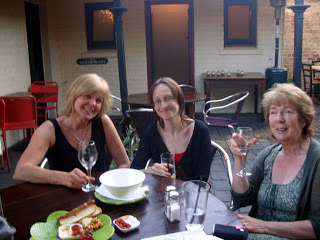 Claire, Orchid and Kathleen
Claire, Orchid and Kathleen
Dunedin is a very Scottish city. The architecture is very familiar to anyone from the northern part of Britain - the cathedral in particular looks very Scottish.
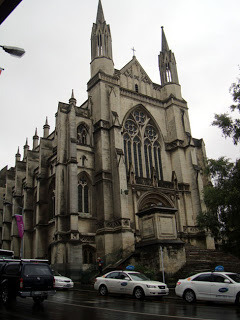 Unlike NZ generally, it seems to have been socially unequal from the beginning. One writer said that it was 'a city where the rich inhabited the hills and looked out to sea and the poor inhabited the flat and looked at each other'. And it still has a reputation for parochialism. In 1983 author and editor Dennis McEldowney wrote that 'Dunedin is a place where it is front page headline news if someone has a fire in their wardrobe'!
Unlike NZ generally, it seems to have been socially unequal from the beginning. One writer said that it was 'a city where the rich inhabited the hills and looked out to sea and the poor inhabited the flat and looked at each other'. And it still has a reputation for parochialism. In 1983 author and editor Dennis McEldowney wrote that 'Dunedin is a place where it is front page headline news if someone has a fire in their wardrobe'!
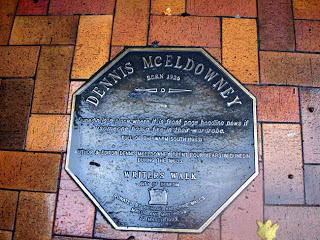
But it has a very good university - Otago - that fosters writers through the Robert Burns Fellowship. It has very high ideals, formulated by another of NZ's big authors, Charles Brasch, 'Part of a university's proper business is to act as nurse to the arts, or, more exactly, to the imagination. . . Imagination may flourish anywhere. But it should flourish as a matter of course in the university, for it is only through imaginative thinking that society grows, materially and intellectually.' I felt like shouting 'if only'! Imagination often seems the last thing our education system nurtures.
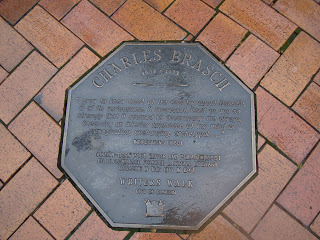
The Scots brought the poetry of Robert Burns to the city - his nephew, the Rev Thomas Burns co-founded the settlement in 1848 and was minister of the first church. Rabbie's statue has pride of place (and provides a good roost!) in the centre of town.
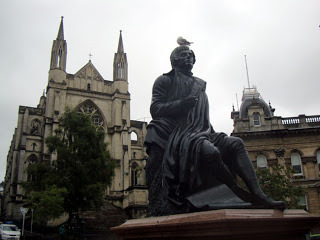
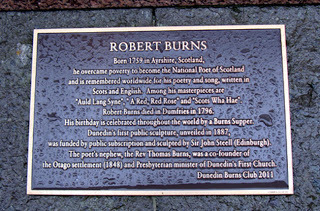
Many of New Zealand's most famous writers have held the fellowship and are commemorated on the 'writer's walk' marked by bronze plaques in the pavement. They include Janet Frame:
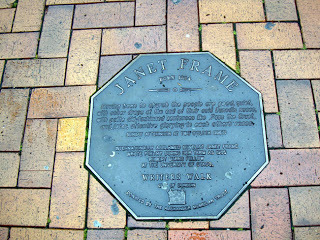
The 'gifted, bawdy and religious poet' James K. Baxter (check him out)
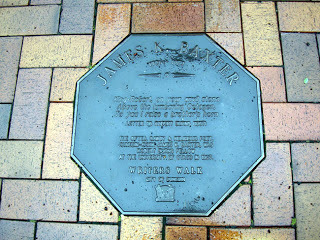
Lauris Edmond (memoirist and poet), Fleur Adcock and the Mauri author of Whale Rider, Witi Ihimaera who's work I didn't really know at all, though I have seen the film. But I suppose that's the purpose of a Writers' Walk - to introduce you to writers you might not have come across.
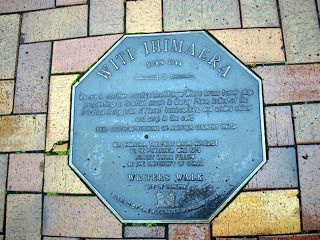
I really like this city and the surrounding landscape. I could live here!
 Claire, Orchid and Kathleen
Claire, Orchid and KathleenDunedin is a very Scottish city. The architecture is very familiar to anyone from the northern part of Britain - the cathedral in particular looks very Scottish.
 Unlike NZ generally, it seems to have been socially unequal from the beginning. One writer said that it was 'a city where the rich inhabited the hills and looked out to sea and the poor inhabited the flat and looked at each other'. And it still has a reputation for parochialism. In 1983 author and editor Dennis McEldowney wrote that 'Dunedin is a place where it is front page headline news if someone has a fire in their wardrobe'!
Unlike NZ generally, it seems to have been socially unequal from the beginning. One writer said that it was 'a city where the rich inhabited the hills and looked out to sea and the poor inhabited the flat and looked at each other'. And it still has a reputation for parochialism. In 1983 author and editor Dennis McEldowney wrote that 'Dunedin is a place where it is front page headline news if someone has a fire in their wardrobe'!
But it has a very good university - Otago - that fosters writers through the Robert Burns Fellowship. It has very high ideals, formulated by another of NZ's big authors, Charles Brasch, 'Part of a university's proper business is to act as nurse to the arts, or, more exactly, to the imagination. . . Imagination may flourish anywhere. But it should flourish as a matter of course in the university, for it is only through imaginative thinking that society grows, materially and intellectually.' I felt like shouting 'if only'! Imagination often seems the last thing our education system nurtures.

The Scots brought the poetry of Robert Burns to the city - his nephew, the Rev Thomas Burns co-founded the settlement in 1848 and was minister of the first church. Rabbie's statue has pride of place (and provides a good roost!) in the centre of town.


Many of New Zealand's most famous writers have held the fellowship and are commemorated on the 'writer's walk' marked by bronze plaques in the pavement. They include Janet Frame:

The 'gifted, bawdy and religious poet' James K. Baxter (check him out)

Lauris Edmond (memoirist and poet), Fleur Adcock and the Mauri author of Whale Rider, Witi Ihimaera who's work I didn't really know at all, though I have seen the film. But I suppose that's the purpose of a Writers' Walk - to introduce you to writers you might not have come across.

I really like this city and the surrounding landscape. I could live here!
Published on February 14, 2013 15:30
February 13, 2013
Down to Dunedin: Albatross and Moeraki Boulders
I haven't been on the blog much - it's all been too hectic here, but in a good way. So many beautiful things to see, so many interesting things to do. Falling into bed exhausted at the end of the day. One of the things we've done this time, is travel down to Dunedin at the bottom end of South Island. People told me that it was rather grey and scottish and the weather was bad, but although it was cooler than Christchurch, we found it really interesting.
On the way down we stopped to see the Moeraki boulders on the beach. Giant, stone cannon balls.
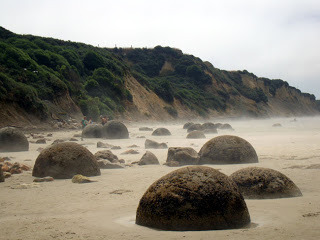
These are strange, geological phenomena - quite eerie, a little like geodes, but perfectly circular.
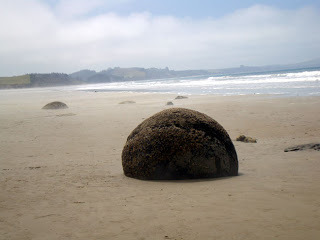
Some of them had broken open and formed rock pools.
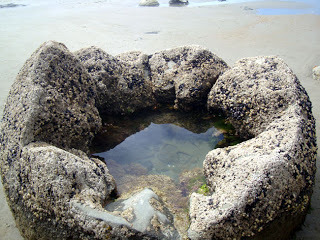 We stayed in a little weekend cottage beside the sea - known as a 'bach' (pronounced batch over here) - with roses round the door - and almost everywhere else!
We stayed in a little weekend cottage beside the sea - known as a 'bach' (pronounced batch over here) - with roses round the door - and almost everywhere else!
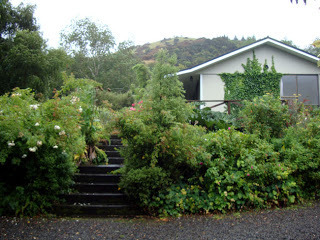
The beaches are wonderful here, with cliffs and stacks and big sand dunes. This is tunnel beach from the cliffs at the top.
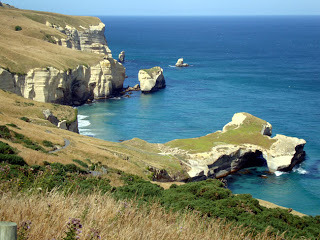
You can only get to it through a tunnel in the rock after a long climb down the cliff path.
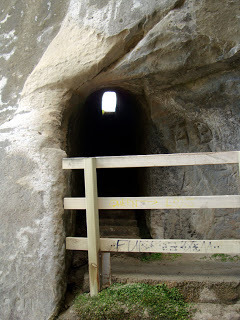
When you get there, the cliffs have been carved into strange shapes by the wind and water. This remind you of anyone?
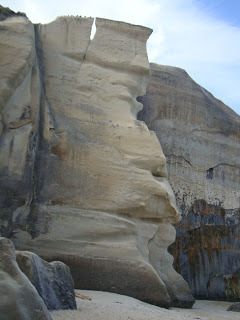
Walking along the beaches we almost fell over a big sea lion playing dead in the sand.
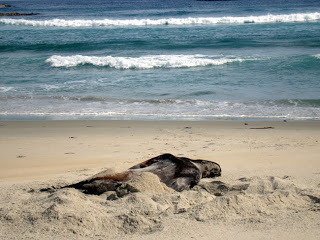
And we managed to see Albatross - both nesting and flying (too high and fast for a photo). This is the best I could do with my tiny camera - an Albatross on the nest with a chick under it.
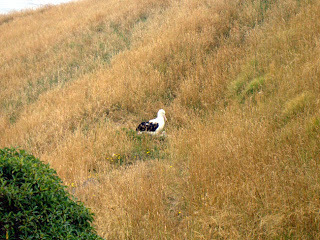
It really is quite magical to get so close to wildlife like this.
Will try to put up some more pics tomorrow. Dunedin itself is a city dedicated to poets! And there are apparently more pipe bands here than in Scotland!
On the way down we stopped to see the Moeraki boulders on the beach. Giant, stone cannon balls.

These are strange, geological phenomena - quite eerie, a little like geodes, but perfectly circular.

Some of them had broken open and formed rock pools.
 We stayed in a little weekend cottage beside the sea - known as a 'bach' (pronounced batch over here) - with roses round the door - and almost everywhere else!
We stayed in a little weekend cottage beside the sea - known as a 'bach' (pronounced batch over here) - with roses round the door - and almost everywhere else!
The beaches are wonderful here, with cliffs and stacks and big sand dunes. This is tunnel beach from the cliffs at the top.

You can only get to it through a tunnel in the rock after a long climb down the cliff path.

When you get there, the cliffs have been carved into strange shapes by the wind and water. This remind you of anyone?

Walking along the beaches we almost fell over a big sea lion playing dead in the sand.

And we managed to see Albatross - both nesting and flying (too high and fast for a photo). This is the best I could do with my tiny camera - an Albatross on the nest with a chick under it.

It really is quite magical to get so close to wildlife like this.
Will try to put up some more pics tomorrow. Dunedin itself is a city dedicated to poets! And there are apparently more pipe bands here than in Scotland!
Published on February 13, 2013 15:30
February 11, 2013
Tuesday Poem: Blue Disremembered Hills by Tim Jones
It was nice, but the town is so small now, the people so old, the main street as wide as time. When the bus arrived, Mum and Dad were waiting for you. You got fish and chips from the Main Street Fish Supply, went home and ate them round the old formica table. They still tasted good. You found out some more abut the war, when Mum made Rolls Royce engines for the planes. You played golf with Dad, like a good son should. You ran the rule over the garden. Then it was time to leave.
There's always that wait at the station, that anxious will-it-come I-hope-it-comes about the bus, and never an announcement. At last it turns up. Last hugs, last kisses, you climb aboard. You're in your seat and they're already receding. Sliding into the past. Sure you love them, but there's a distance there. 'Cos you're a big boy now, almost a man.
Read a book, take a nap, have a pie and a piss at Clinton. Rattle on through the Taieri Plains. Dunedin's getting closer. Woo-hoo! The Verlaines at the Empire, Sneaky Feelings at the Ori. What more could a young man want?
One last climb before you hit Dunedin, past those blue disremembered hills. Two peaks: one still whole, one torn apart for gravel to make the streets, to make the motorways, to make the roads to bear you home. As you#ve grown bigger, it's grown smaller.
you travel up to the saddle, your self-image puffing up around you. It shrinks to nothing when you hit the other side.
Tim Jones: Men Briefly Explained
Interactive Press, Brisbane
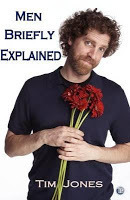
I really enjoyed Tim Jones' latest collection, Men Briefly Explained, and keep going back to it. Every time I do, I find something new that somehow didn't get noticed last time. This piece of prose-poetry really does convey that feeling of going back home for a visit once you've left and finding that you've left in more ways than you realised. Men Briefly Explained is available in both paperback and Kindle formats. Tim is also a writer of speculative fiction and has a very good blog called Books in the Trees.
Please visit the Tuesday Poem Hub for more exciting poetry from around the world posted by the Tuesday Poets.
There's always that wait at the station, that anxious will-it-come I-hope-it-comes about the bus, and never an announcement. At last it turns up. Last hugs, last kisses, you climb aboard. You're in your seat and they're already receding. Sliding into the past. Sure you love them, but there's a distance there. 'Cos you're a big boy now, almost a man.
Read a book, take a nap, have a pie and a piss at Clinton. Rattle on through the Taieri Plains. Dunedin's getting closer. Woo-hoo! The Verlaines at the Empire, Sneaky Feelings at the Ori. What more could a young man want?
One last climb before you hit Dunedin, past those blue disremembered hills. Two peaks: one still whole, one torn apart for gravel to make the streets, to make the motorways, to make the roads to bear you home. As you#ve grown bigger, it's grown smaller.
you travel up to the saddle, your self-image puffing up around you. It shrinks to nothing when you hit the other side.
Tim Jones: Men Briefly Explained
Interactive Press, Brisbane

I really enjoyed Tim Jones' latest collection, Men Briefly Explained, and keep going back to it. Every time I do, I find something new that somehow didn't get noticed last time. This piece of prose-poetry really does convey that feeling of going back home for a visit once you've left and finding that you've left in more ways than you realised. Men Briefly Explained is available in both paperback and Kindle formats. Tim is also a writer of speculative fiction and has a very good blog called Books in the Trees.
Please visit the Tuesday Poem Hub for more exciting poetry from around the world posted by the Tuesday Poets.
Published on February 11, 2013 22:35
February 4, 2013
Tuesday Poem: 'A Little Pneumonia' by Jan Kemp
A little pneumoniato Katherine Mansfield
The German for lung is Lungenflügel- lungwing -clever you, Katy, calling it your ‘wing’ to fly. Now,
one of mine’s infected too & antibiotics will kill all those bacteria, well, on the wing. Also cures
gonorrhoea, would have cured your TB & you’d have had more life, looking in death's face at 34:
‘shall I try to get up, if I do will I cough, if I cough I can’t breathe,’ ‘lift my head Ida,’
‘say it pathetically, please’ (you quote yourself) into the pillow. ‘I’ve got to try.’ Your will, that steel.
Lunch over, having to lie down again, (know what you mean & me a swimmer. Lungs!), then,
all those stories like mist off the land lifting up to your pen; then, all that quick,
fine, flying work till they found their places: your children of the sun.
Jan Kemp: Voicetracks, Puriri Press (Auckland) dennyjhs@xtra.co.nz & Tranzlit (Kronberg im Taunus) tranzlit@iconz.co.nz (2012)
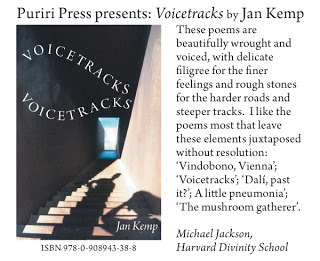
I'm currently in New Zealand and I thought it would be really good to feature some NZ poets while I'm over here. The first was Helen Lowe and the second is Jan Kemp. I loved this poem when she first published it in the Katherine Mansfield Society Newsletter. Jan's just been over to the UK to record some of her poems for the Poetry Archive. A Little Pneumonia is now included in Jan's latest collection of poetry, Voicetracks, which can be ordered from the publisher below. Also her previous collection Dante's Heaven . The title poem is here the subject of a painting by Richard Bavin - beautiful! Tranzlit, Kronberg im Taunus, Germany
<www.tranzlit.de> <www.tranzlit.com>
email: <jantranzlit@iconz.co.nz>
For those who haven't yet read Jan's work. She was born in Hamilton, New Zealand, in 1949. She was the sole woman anthologized in The Young New Zealand Poets (1973), and in 1979 co-starred with Alistair Campbell, Hone Tuwhare, and Sam Hunt on a national poetry-reading tour. During the next two decades, while the gender balance among New Zealand poets spectacularly changed, she taught in universities in the South Pacific, Asia, and Europe. For nine years she was based at the National University of Singapore. More recently, married to eminent professor and analyst of postcolonial literature in English, Dieter Riemenschneider, she and her husband shuttled between the two hemispheres, with bases in Frankfurt and Auckland, finally settling outside Frankfurt in September 2007.
For more Tuesday Poems, please pop over to the Tuesday Poem Hub and see what the other members are posting.
Published on February 04, 2013 15:30
February 3, 2013
At Lake Coleridge
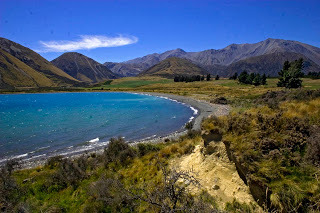 Lake Coleridge As a native of the English Lake District, I just had to visit Lake Coleridge - a spectacular stretch of water in the mountains of South Island New Zealand. It was named in 1848 after nephews of the poet surveyed the area for settlement. It's Mauri name is Whakamatua and it's situated within sight of Mt Hutt. You can see the mountains rising towards you out of the flat Canterbury Plain as you drive out of Christchurch.
Lake Coleridge As a native of the English Lake District, I just had to visit Lake Coleridge - a spectacular stretch of water in the mountains of South Island New Zealand. It was named in 1848 after nephews of the poet surveyed the area for settlement. It's Mauri name is Whakamatua and it's situated within sight of Mt Hutt. You can see the mountains rising towards you out of the flat Canterbury Plain as you drive out of Christchurch.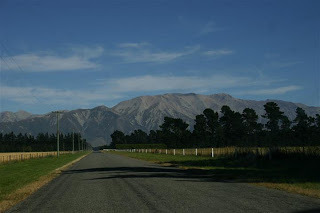
It was a scorching day, bouncing the hire car (don't tell them!) down gravel tracks that generate a trail of dust. Down and round, through the mountains until an impossibly blue lake began to glare through the gaps.
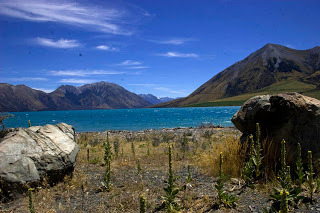
It was very windy and there were real waves smashing on the shore. Apart from a few wader birds, we had it all to ourselves.
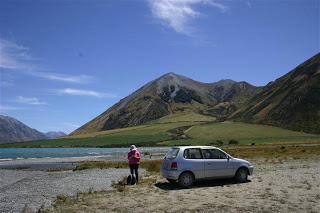
We also stopped at Rakaia Gorge, where the river narrows and becomes very deep. We had this to ourselves too.
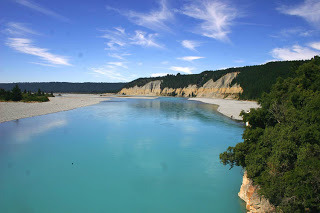 The 'narrow' version of the river!
The 'narrow' version of the river!Rivers in New Zealand can be a mile wide channel of gravel, flood debris and threads of that glacial blue that is startling and somehow almost artificial. They are not tame, peaceful affairs as they are in England, but wild torrents even in summer, blitzing their way through the banks of gravel and rock. In spate they must be genuinely awesome!
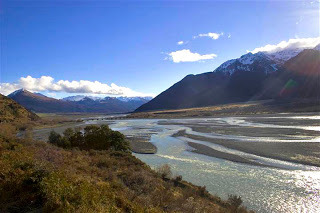 One of New Zealand's big rivers.
One of New Zealand's big rivers.We went for a short walk around the shore-line (all we could take in the 30+ heat) and then I sat beside the lake for a couple of hours, feeling very peaceful and very lucky to be there. The world, however bad things are economically and politically, is so stunningly beautiful.
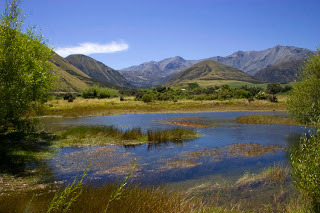 One of Lake Coleridge's lagoons.
One of Lake Coleridge's lagoons.
Published on February 03, 2013 00:30
January 30, 2013
Christchurch: the missing city
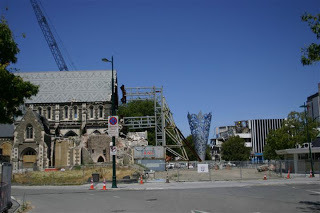 Cathedral and City Centre It's two and half years since the September quake in Christchurch. I was there, in the centre of the city and walked round the streets, in a state of shock, in the hours following the quake. This is my first visit since and we spent a day walking round the streets you're still allowed to walk down, looking at the devastation.
Cathedral and City Centre It's two and half years since the September quake in Christchurch. I was there, in the centre of the city and walked round the streets, in a state of shock, in the hours following the quake. This is my first visit since and we spent a day walking round the streets you're still allowed to walk down, looking at the devastation.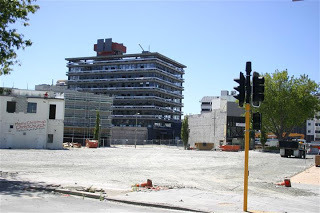
Many buildings have already been bulldozed, and the ones that are left are waiting for demolition. Some of them look OK, but when you go closer you can see the cracks, or the unnatural tilt of the walls. In some cases, the buildings were brand new before the quake, but floors and concrete beams are cracked right through.
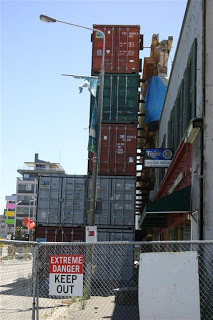 I don't think the rest of the world really knows what it's like for the residents here - they've all moved on after the initial shock. But shops, wine bars, businesses, restaurants, swimming pools, libraries and other amenities have all vanished - ordinary life has changed for ever.
I don't think the rest of the world really knows what it's like for the residents here - they've all moved on after the initial shock. But shops, wine bars, businesses, restaurants, swimming pools, libraries and other amenities have all vanished - ordinary life has changed for ever.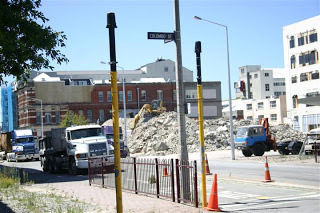 Every pile of rubble represents someone's life or livelihood
Every pile of rubble represents someone's life or livelihood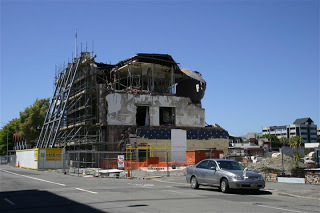 An older, historic building they're trying to preserve.
An older, historic building they're trying to preserve.I visited friends who are living in rented houses - quake damaged, but not so damaged as their own houses and they're still waiting to have them either replaced or repaired. Lives in limbo. Others have lost businesses or jobs. Many have moved away. I met a woman who was too frightened to come into the city at all and only shops on the perimeter.
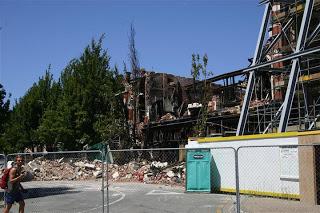 This row of houses has fallen despite attempts to shore up the shattered buildings. The re-start project was interesting - a whole street of shops and coffee bars set up in brightly painted containers.
This row of houses has fallen despite attempts to shore up the shattered buildings. The re-start project was interesting - a whole street of shops and coffee bars set up in brightly painted containers.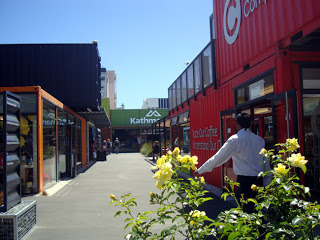 You can hardly believe it's all containers! They use containers for everything here - even just blocking the roads to protect from rockfalls.
You can hardly believe it's all containers! They use containers for everything here - even just blocking the roads to protect from rockfalls.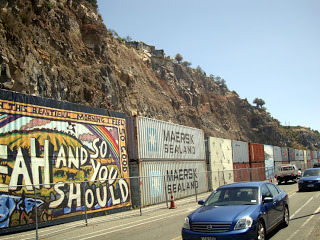
Sumner beach used to be my favourite place. Now many of the houses are abandoned as unsafe, and some of them have ended up at the bottom of the cliff, or are left suspended, like bombed out houses in a war zone.
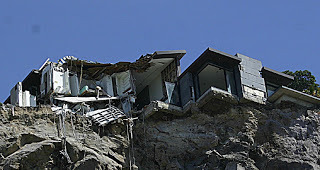
But the most poignant is the site of the CTV building where so many people died. There are flowers and tributes tied to the fence and on the other side of the road, chairs are set out - one chair for each person who died.
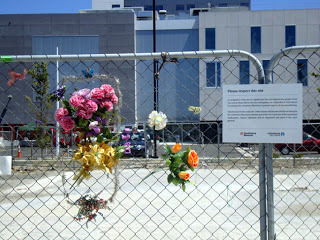
Published on January 30, 2013 18:24
January 28, 2013
Tuesday Poem: All Over by Helen Lowe
All Over
On that first afternoonit was all about noise:sirens, the continual tuk-tuk-tukof helicopters, and the slow droneof planes airlifting in supplies—noiseand the smell of smokehanging in a pallacross the inner suburbsas the CTV building burned.
But in the days followingI recall the silence of a citywhere daily business had all but ceased,cars off the road, people staying home—or fled. And at night, the profound darknessof a power blackout. On the eveningwhen the street lights blinked back onwe were out walking in the blue dusk:the light overhead flick-flick-flickered –then the whole street was bathedin saffron haze, illuminating the far side of the road and a friend outside the wreckagethat had once been her business.
My friend’s father, helping her,had just lost his home, and she,looking dry-eyed at collapsed bricks,said simply: “It’s over. It’s all over.”
© Helen Lowe, 2011
I'm in Christchurch which was changed forever by three huge earthquakes - September 4th 2010, February 22nd 2011 and June 13 2011. I was there for the first earthquake and the terrible aftershocks (more than 90 in the first 24 hours) and still remember the horror of it. Helen's poem captures the surreal atmosphere, the sounds, the images, the stoicism of people caught up in the destruction of their lives. I felt it was a fitting commemoration of what the people of Christchurch, and the surrounding countryside, have been through. Thank you Helen for letting me post it here.
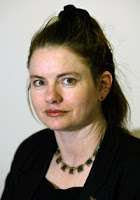
Helen Lowe is an award-winning (as in big, international awards) Christchurch poet and novelist, author of Thornspell, the Heir of Night, and the Gathering of the Lost. Check out her publications and her website here.
Please take a look at the Tuesday Poem Hub for more poetry and check out the Tuesday Poets' contributions in the sidebar. It's a feast of poetry!
On that first afternoonit was all about noise:sirens, the continual tuk-tuk-tukof helicopters, and the slow droneof planes airlifting in supplies—noiseand the smell of smokehanging in a pallacross the inner suburbsas the CTV building burned.
But in the days followingI recall the silence of a citywhere daily business had all but ceased,cars off the road, people staying home—or fled. And at night, the profound darknessof a power blackout. On the eveningwhen the street lights blinked back onwe were out walking in the blue dusk:the light overhead flick-flick-flickered –then the whole street was bathedin saffron haze, illuminating the far side of the road and a friend outside the wreckagethat had once been her business.
My friend’s father, helping her,had just lost his home, and she,looking dry-eyed at collapsed bricks,said simply: “It’s over. It’s all over.”
© Helen Lowe, 2011
I'm in Christchurch which was changed forever by three huge earthquakes - September 4th 2010, February 22nd 2011 and June 13 2011. I was there for the first earthquake and the terrible aftershocks (more than 90 in the first 24 hours) and still remember the horror of it. Helen's poem captures the surreal atmosphere, the sounds, the images, the stoicism of people caught up in the destruction of their lives. I felt it was a fitting commemoration of what the people of Christchurch, and the surrounding countryside, have been through. Thank you Helen for letting me post it here.

Helen Lowe is an award-winning (as in big, international awards) Christchurch poet and novelist, author of Thornspell, the Heir of Night, and the Gathering of the Lost. Check out her publications and her website here.
Please take a look at the Tuesday Poem Hub for more poetry and check out the Tuesday Poets' contributions in the sidebar. It's a feast of poetry!
Published on January 28, 2013 12:43
January 27, 2013
It's definitely New Zealand
Could it be anywhere else? This country is just so beautiful - it always knocks me out. I'm typing this looking out of the window at a golden field of barley rippling away across the plain to a deep blue evening sky with a full moon suspended just above the horizon. A few moments ago a large Marsh Harrier was sweeping the field for supper. To the right, the port hills rise, rather like the Lake District fells - a russet colour, just catching the last glow of the sunset. I've played with my grandchildren, met Bounce the cow and drank more than I should have of NZ white wine. Bliss. Yesterday we were on the beach, walking along a very wild stretch of coast with a strong wind blowing.
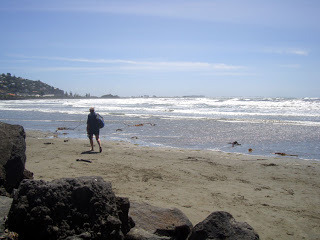
We started out on Monday in a sodden Pietrasanta after 36 hours of torrential rain. The railway station was flooded and to get to our platform we had to climb through a metal fence, throwing our suitcases over the top!
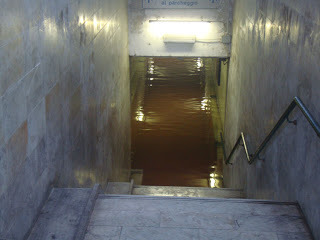 Flooded Station at Pietrasanta
Flooded Station at Pietrasanta
Northern Italy was covered in snow - very alpine, and shiveringly cold.
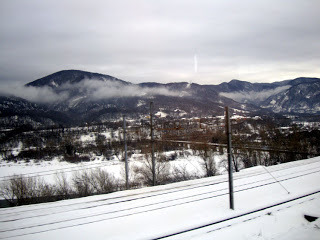 From the train near TurinOn Wednesday evening, after long delays (snow in Milan, fog in Dubai, chaos in Bangkok) we finally made New Zealand - late, jet-lagged, filthy after three days in the same clothes - but very, very glad to be there. Now, body and soul have just about re-connected after a quiet day at Akaroa, looking at the sea. I didn't know how tired I was, mentally and physically, until I got here.
From the train near TurinOn Wednesday evening, after long delays (snow in Milan, fog in Dubai, chaos in Bangkok) we finally made New Zealand - late, jet-lagged, filthy after three days in the same clothes - but very, very glad to be there. Now, body and soul have just about re-connected after a quiet day at Akaroa, looking at the sea. I didn't know how tired I was, mentally and physically, until I got here.
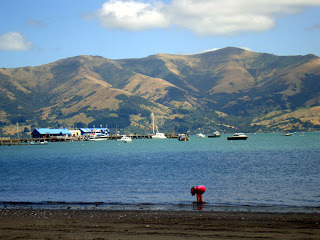 Akaroa
Akaroa

We started out on Monday in a sodden Pietrasanta after 36 hours of torrential rain. The railway station was flooded and to get to our platform we had to climb through a metal fence, throwing our suitcases over the top!
 Flooded Station at Pietrasanta
Flooded Station at PietrasantaNorthern Italy was covered in snow - very alpine, and shiveringly cold.
 From the train near TurinOn Wednesday evening, after long delays (snow in Milan, fog in Dubai, chaos in Bangkok) we finally made New Zealand - late, jet-lagged, filthy after three days in the same clothes - but very, very glad to be there. Now, body and soul have just about re-connected after a quiet day at Akaroa, looking at the sea. I didn't know how tired I was, mentally and physically, until I got here.
From the train near TurinOn Wednesday evening, after long delays (snow in Milan, fog in Dubai, chaos in Bangkok) we finally made New Zealand - late, jet-lagged, filthy after three days in the same clothes - but very, very glad to be there. Now, body and soul have just about re-connected after a quiet day at Akaroa, looking at the sea. I didn't know how tired I was, mentally and physically, until I got here. Akaroa
Akaroa
Published on January 27, 2013 00:40
January 21, 2013
Nocturne: Dennis O'Driscoll
Time for sleep. Time for a nightcap of grave music,
a dark nocturne, a late quartet, a parting song,
bequeathed by the great dead in perpetuity.
I catch a glance sometimes of my own dead at the window,
those whose traits I share; thin as moths, as matchsticks,
they stare into the haven of the warm room, eyes ablaze.
It is Sunday a lifetime ago. A woman in a now-demolished house
sings Michael, Row the Boat Ashore as she sets down the bucket
with its smooth folds of drinking water . . .
The steadfast harvest moon out there, entangled in the willow’s
stringy hair, directs me home like T’ao Ch’ien; A caged bird
pines for its first forest, a salmon thirsts for its stream.
Dennis O’Driscoll
Weather Permitting, Anvil Press
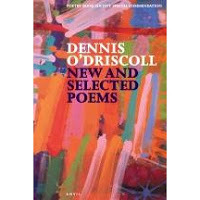
The Irish poet Dennis O’Driscoll died suddenly on Christmas Eve aged only 58. I’ve recently been reading his collection ‘ Weather Permitting’ and enjoying his work. The poem above is the last poem in the collection and its mood, both elegiac and prescient, seems a suitable choice for today’s blog. Dennis seems to have been a poet who made his own way, regardless of fashions, and with total disregard for notions of marketing. There’s a kind of quiet joy in his language and I love the ‘Irishness’ of the images. Seamus Heaney wrote a beautiful obituary in the Guardian , click here to read. New and Selected Poems is his most recent collection and it contains poems included in Weather permitting.
Dennis’s acclaimed 2008 interviews with Nobel Laureate Seamus Heaney, Stepping Stones, published by Faber, is available both as a paperback and on Kindle - I’ve just loaded it on mine to read while travelling.
I’m currently in the air somewhere (hopefully) on my way to New Zealand and for the next few weeks will be featuring some New Zealand poets as my contribution to the Tuesday Poem.
If you’d like to read more poetry, please take a look at the Tuesday Poem website and check out the poets in the left-hand sidebar.
Nocturne from Weather Permitting, Anvil Press 1999
a dark nocturne, a late quartet, a parting song,
bequeathed by the great dead in perpetuity.
I catch a glance sometimes of my own dead at the window,
those whose traits I share; thin as moths, as matchsticks,
they stare into the haven of the warm room, eyes ablaze.
It is Sunday a lifetime ago. A woman in a now-demolished house
sings Michael, Row the Boat Ashore as she sets down the bucket
with its smooth folds of drinking water . . .
The steadfast harvest moon out there, entangled in the willow’s
stringy hair, directs me home like T’ao Ch’ien; A caged bird
pines for its first forest, a salmon thirsts for its stream.
Dennis O’Driscoll
Weather Permitting, Anvil Press

The Irish poet Dennis O’Driscoll died suddenly on Christmas Eve aged only 58. I’ve recently been reading his collection ‘ Weather Permitting’ and enjoying his work. The poem above is the last poem in the collection and its mood, both elegiac and prescient, seems a suitable choice for today’s blog. Dennis seems to have been a poet who made his own way, regardless of fashions, and with total disregard for notions of marketing. There’s a kind of quiet joy in his language and I love the ‘Irishness’ of the images. Seamus Heaney wrote a beautiful obituary in the Guardian , click here to read. New and Selected Poems is his most recent collection and it contains poems included in Weather permitting.
Dennis’s acclaimed 2008 interviews with Nobel Laureate Seamus Heaney, Stepping Stones, published by Faber, is available both as a paperback and on Kindle - I’ve just loaded it on mine to read while travelling.
I’m currently in the air somewhere (hopefully) on my way to New Zealand and for the next few weeks will be featuring some New Zealand poets as my contribution to the Tuesday Poem.
If you’d like to read more poetry, please take a look at the Tuesday Poem website and check out the poets in the left-hand sidebar.
Nocturne from Weather Permitting, Anvil Press 1999
Published on January 21, 2013 15:30
January 20, 2013
Off to New Zealand and Cambodia
Almost packed - things piled up on the bed to go into already full suitcases. Probably forgotten several essentials! We are heading for summer down under, but NZ can be cool with a southerly wind blowing straight from Antarctic. We're leaving a very wet Italy - torrential rain with a gale blowing and you can't even see the sea. For once, no regrets about leaving.
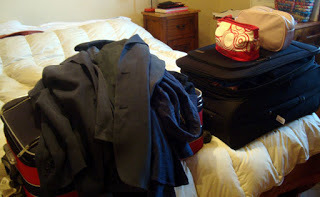
Have stripped the bed and scrubbed the floors and dusted the corners. Odd how the prospect of another woman staying in your house motivates you into cleaning mode! A friend, who is also a sculptor, is house-sitting for us and feeding our cats while we're away. This is really good, because last year all the pipes froze during February when we were away for two weeks. I've just been making lots and lots of lists and leaving pieces of paper around the house to let her know where everything is and how it works.
Now is the scary bit - leaving, turning the key in the lock, dragging the suitcases up from the olive grove to the car park and setting off (by train) for Milan. From there we catch a flight to Dubai, then another to Bangkok, then somewhere else, and probably the Galapagos islands for good measure, since this is a ridiculously cheap flight. We set off on Monday morning at 7.30am and get to Christchurch New Zealand at 3.30pm on Wednesday! I'm really thrilled at the idea of seeing my daughter and her family again after two years, but a bit nervous at the prospect of having to give a lecture in Wellington.
I will be blogging with pics about all the places we go to. On February 16th we're on our way back via Cambodia and I'm really looking forward to another visit there. We won't have internet access on the islands we're going to, but I'll put up some pictures as soon as I'm back in cyberland again.
Now I've got to go and scrub the kitchen floor - will be so exhausted I'll sleep like a baby on the plane (fingers crossed!).

Have stripped the bed and scrubbed the floors and dusted the corners. Odd how the prospect of another woman staying in your house motivates you into cleaning mode! A friend, who is also a sculptor, is house-sitting for us and feeding our cats while we're away. This is really good, because last year all the pipes froze during February when we were away for two weeks. I've just been making lots and lots of lists and leaving pieces of paper around the house to let her know where everything is and how it works.
Now is the scary bit - leaving, turning the key in the lock, dragging the suitcases up from the olive grove to the car park and setting off (by train) for Milan. From there we catch a flight to Dubai, then another to Bangkok, then somewhere else, and probably the Galapagos islands for good measure, since this is a ridiculously cheap flight. We set off on Monday morning at 7.30am and get to Christchurch New Zealand at 3.30pm on Wednesday! I'm really thrilled at the idea of seeing my daughter and her family again after two years, but a bit nervous at the prospect of having to give a lecture in Wellington.
I will be blogging with pics about all the places we go to. On February 16th we're on our way back via Cambodia and I'm really looking forward to another visit there. We won't have internet access on the islands we're going to, but I'll put up some pictures as soon as I'm back in cyberland again.
Now I've got to go and scrub the kitchen floor - will be so exhausted I'll sleep like a baby on the plane (fingers crossed!).
Published on January 20, 2013 08:46



